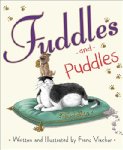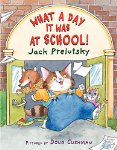Over the years I have encountered several poetry collections where poets have take other people's writings and have changed them in little ways to make them accessible for young readers. Often the changes add touches of humor to the poems. In today's poetry title, Iza Trapani does this to great effect, taking young readers into the school life of a little dog character.
 Rufus and Friends: School Days
Rufus and Friends: School Days
 Rufus and Friends: School Days
Rufus and Friends: School Days
Iza Trapani
Poetry Picture Book
For ages 5 to 7
Charlesbridge, 2010, 978-1-58089-249-0
It is a rainy day, Rufus is off to school, and he “can’t
wait,” because “My teacher and my friends are great.” As he hops on the school
bus he invites us to join him. When they arrive at school the little dog
children march into the building and head to their classrooms, though Rufus has
to pause for a moment “to suck his thumb.”
Once Rufus and
his friends are in their classroom they begin their day. They have a “busy day”
ahead full of writing, reading, drawing, and will learn “some things worth
knowing.”
Presiding over
the classroom is a “neat little clock” which “points to the time / With its two
little hands.” The clock always has a clean face and those hands are always
ready “To do what is right.” One can hope that the children in the class will
have similarly clean faces and ready hands, but sometimes things do not go “as
we planned” and the students, despite all their good intentions, end up with
paint and glue in unexpected places.
After several
hours of laboring away, the children have lunch, which is most unappetizing,
and then they go outside to play. The children jump rope, throw a ball around,
or play on the swings and slide, but Joan, who loves “books a lot” finds a spot
under a tree to read a book. With a book in hand Joan never feels alone.
In Mrs. Alegro’s
music class the children have a grand time playing musical instruments of all
kinds. Tom-Tom is a wonderful flute player and he tootles away to the delight
of his classmates. Later, in the library, the children are not as well behaved
as they should be. They talk, wriggle, and giggle. They are rambunctious and
the librarian is not at all happy.
In this splendid
poetry picture book Iza Trapani presents children with some traditional poems
which she has “extended” in creative ways. Taking us through the school day,
she gives us familiar poems such as One,
Two, Buckle My Shoe, and songs such as The
Ants go Marching. There are also poems that children may not be familiar
with, but which offer readers wonderful opportunities to enjoy the written and
spoken word.



